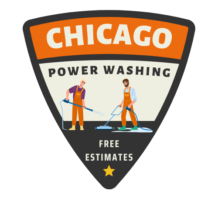Chicago Power Washing FAQ's
Have you ever wondered if power washing can increase your water bill? Or maybe you’re curious about how long it takes to power wash a house? With so many questions surrounding power washing, we’re here to provide you with the answers you need.
Power washing is a popular cleaning method that can effectively remove dirt, grime, mold, and other buildup from various surfaces. Whether you’re considering power washing your home, driveway, or vinyl siding, it’s important to have a clear understanding of the process and its benefits.
In this article, we’ll address some of the top power washing FAQs and provide you with valuable tips to ensure successful power washing. From water consumption to duration and frequency, we’ve got you covered. So let’s dive in and discover the answers together.
Key Takeaways:
- Power washing uses significantly less water compared to using a standard garden hose.
- The duration of a power washing job depends on factors such as the size and condition of the house.
- Regular power washing helps maintain the appearance and integrity of driveways and vinyl siding.
Do Power Washing Companies Use Your Water?
If you’re considering hiring a power washing contractor, you may be wondering if they will use your water supply or if they bring their own. Let’s explore the typical practices of power washing companies when it comes to water usage.

Most power washing professionals utilize the water supply available at the property they are servicing. As long as your water has adequate flow and pressure, the contractor will be able to connect their equipment directly to your water source. This means that you won’t have to provide any additional water for the power washing job.
Using your water supply is generally the standard practice for power washing contractors. It ensures a convenient and efficient cleaning process while minimizing any additional expenses for the client. By utilizing your property’s existing water supply, power washing companies can effectively remove dirt, grime, mold, and other debris to leave your surfaces looking clean and refreshed.
However, it’s important to note that there are some situations where a power washing contractor may need to bring their own water. This typically occurs when the property has a limited or low-pressure water supply that cannot meet the requirements of the power washing equipment. In such cases, the contractor may bring a water tank or truck with them to ensure an adequate water supply.
Additional Charges and Considerations
When a power washing contractor needs to bring their own water, it may result in additional charges. The cost of transporting, storing, and using their own water can vary depending on the contractor and the specific job requirements. It’s crucial to discuss these details and any potential extra costs with the contractor before starting the project.
Furthermore, it’s worth noting that using your own water supply may be more cost-effective and environmentally-friendly. By utilizing your water, you avoid the need for transportation and reduce the overall carbon footprint associated with the power washing process. Power washing equipment tends to be designed to work efficiently with regular water supplies, so this approach is generally the most practical and preferred option.
Overall, power washing companies typically use your water supply unless it’s insufficient or there are other specific circumstances. Consult with your chosen power washing contractor to confirm their water usage practices and ensure a smooth and successful cleaning experience.
| Using Your Water Supply | Bringing Their Own Water |
|---|---|
|
|
Does Power Washing Increase Your Water Bill?
When it comes to power washing, one concern that may come to mind is whether it will have a significant impact on your water bill. After all, if you pay for water based on consumption, it’s essential to consider the water usage associated with this cleaning method. The great news is that power washing actually uses significantly less water compared to using a standard garden hose.
Pressure washers, the primary tool used for power washing, are designed to deliver a focused stream of water at high pressure. This focused stream allows for a thorough and efficient cleaning process while utilizing less water. In fact, pressure washers use approximately 90% fewer gallons of water per minute compared to a typical garden hose.
By utilizing the power of pressure washers, you can achieve excellent cleaning results with minimal water consumption. This can be particularly advantageous if you live in an area where water costs are high or if you’re conscious of your water usage for environmental reasons.
Not only does power washing save you water, but it also saves you money on your water bill in the long run. With less water being used during the power washing process, the impact on your water bill is likely to be minimal. You can enjoy the benefits of a clean and refreshed exterior without worrying about a significant increase in your expenses.
It’s important to note that while power washing is generally water-efficient, the duration of the power washing session and the size of the area being cleaned can still affect your overall water usage. However, even if it takes a bit longer to complete the job or if you have a larger surface to clean, power washing remains a more efficient option compared to conventional cleaning methods.
So, leave your concerns about a hefty water bill behind when considering power washing. Not only will it help you achieve outstanding results, but it will also minimize your water usage and leave you with a cleaner and fresher-looking property.

How Long Does It Take to Power Wash a House?
When it comes to power washing your house, you might be wondering how long the process will take. The duration of a power washing job can vary depending on different factors, such as the condition and size of your home, as well as the surrounding terrain.
On average, it can take anywhere from 1 to 4 hours to power wash a house. However, for larger or heavily soiled properties, the time needed might be longer. Conversely, if you have a smaller home that requires minimal cleaning, the process could be much quicker.
It’s important to understand that power washing is a meticulous task that requires attention to detail. The technician will need to thoroughly clean every surface, including siding, windows, and even hard-to-reach areas like gutters.
Pro Tip: To ensure an efficient and timely power washing experience, consider tidying up any outdoor furniture or objects that may obstruct the technician’s work.
Now, let’s delve into a comprehensive breakdown of the factors that can influence the duration of a power washing job:
- House Size and Complexity: Larger houses naturally require more time to clean compared to smaller ones. The square footage of the property and the number of levels will impact the overall duration. Additionally, complex architectural features, such as ornate moldings and intricate designs, might require extra attention, resulting in a lengthier process.
- Condition of the House: If your house has significant buildup of dirt, mold, mildew, or stains, the power washing process may take longer. Stubborn grime might require additional time and effort to remove completely.
- Access and Surrounding Terrain: The accessibility of your house, including the proximity of bushes, trees, and fences, can influence the time needed to complete the job. Technicians may need to maneuver around obstacles to ensure a thorough cleaning of all surfaces.
So, if you’re expecting a thorough power washing of your entire house, it’s best to allocate a few hours to ensure a top-quality result. Remember, the key is to be patient and allow the technician to work diligently, ensuring every nook and cranny receives the attention it needs.
Pro Tip: If you have any specific concerns or areas of focus, be sure to communicate them with the power washing professional beforehand. This way, they can allocate the necessary time and resources to address your unique requirements.
Comparing Power Washing Duration to Other Cleaning Methods
“Power washing is a highly effective and time-saving cleaning method compared to traditional cleaning techniques.”
When considering power washing as a cleaning option, it’s helpful to understand how it compares to other methods in terms of efficiency and time. Here’s a quick comparison:
| Cleaning Method | Duration |
|---|---|
| Power Washing | 1-4 hours (depending on various factors) |
| Hand Scrubbing | 10+ hours for an average-sized house |
| Garden Hose Cleaning | 3-5 hours for an average-sized house |
As you can see, power washing significantly reduces the cleaning time compared to hand scrubbing or using a garden hose. Its high-pressure capabilities, combined with specialized cleaning solutions, allow for a more thorough and efficient cleaning process.
Power Washing Jobs in Chicago – Home & Business

Now that you have a better understanding of the average duration of power washing, you can plan accordingly and even schedule your power washing appointment with confidence.
How Many Gallons of Water Does It Take to Power Wash a House?
When it comes to power washing your house, you might be concerned about water consumption. After all, conserving water is important for the environment and can also impact your water bill. Fortunately, power washing is a highly efficient cleaning method that uses significantly less water than other alternatives.
On average, a power washer uses only about 2 gallons of water per minute compared to a standard garden hose that uses approximately 20 gallons per minute. This means that power washing consumes about 90% less water, making it an eco-friendly choice for cleaning your house’s exterior.
“Power washing uses significantly less water compared to using a standard garden hose.”
By utilizing high pressure and specialized nozzles, power washers are able to achieve effective cleaning results with minimal water usage. This is especially important considering the large surface area that needs to be cleaned when power washing a house.
Not only does power washing conserve water, but it also saves you money on your water bill. With the average cost of water increasing in many areas, reducing water consumption can be beneficial for your household budget. By choosing power washing over traditional cleaning methods, you can enjoy a clean house while minimizing your environmental impact.

How Often Should You Power Wash Your Driveway?
Maintaining a clean driveway is essential to ensure its longevity and aesthetic appeal. Regular power washing is a highly effective method to keep your driveway free from dirt, mold, and other debris. But how often should you schedule driveway power washing to maintain its cleanliness?
Ideally, driveways should be power washed at least once a year. This frequency allows you to effectively remove accumulated grime and prevent any potential damage caused by long-term exposure to dirt and contaminants. A yearly power wash will restore your driveway’s appearance and enhance its curb appeal.
However, if you live in an area with particularly harsh weather, heavy traffic, or have numerous trees and vegetation near your driveway, you may need to schedule power washing more frequently. In such cases, biannual power washing (every six months) may be recommended to keep up with the cleaning demands.
When scheduling your driveway power washing, it’s important to consider the current condition of your driveway and any visible signs of dirt, stains, or mold. If you notice substantial dirt buildup or stubborn stains, it may be necessary to perform power washing more frequently to maintain a clean and attractive driveway.
Additionally, power washing your driveway right before any special events or gatherings can give your property a fresh and well-maintained appearance.
Regular power washing not only helps maintain the cleanliness of your driveway but also protects its integrity. By removing dirt, mold, and other contaminants, you can prevent potential damage and prolong the lifespan of your driveway.

Tips to Maintain a Clean Driveway:
- Sweep your driveway regularly to remove loose debris and prevent it from accumulating.
- Address any spills or stains promptly to minimize the risk of permanent discoloration.
- Use a mild detergent or specialized driveway cleaner to tackle stubborn stains.
- Avoid using abrasive materials or harsh chemicals that may damage the surface of your driveway.
- Consider applying a protective sealant to your driveway after power washing to enhance its resistance to stains and weathering.
By following these tips and maintaining a regular power washing schedule, you can ensure that your driveway remains clean, attractive, and in excellent condition for years to come.
| Frequency | Cleaning Intensity |
|---|---|
| Once a Year | Regular maintenance; suitable for most driveways |
| Biannually (Every Six Months) | Recommended for driveways in areas with harsh weather conditions, heavy traffic, or significant vegetation nearby |
How Often Should You Power Wash Vinyl Siding?
When it comes to maintaining clean and beautiful vinyl siding, regular power washing is key. By power washing your vinyl siding, you can effectively remove dirt, grime, mold, and mildew, giving your home a fresh and revitalized look.
As a general guideline, it is recommended to power wash your vinyl siding at least once a year. This annual cleaning helps eliminate any accumulated dirt or debris that may have built up over time. By staying on top of regular power washing, you can prevent the growth of mold and mildew, which can cause discoloration and damage to your siding.
However, if your vinyl siding appears to be visibly clean and free from any buildup or stains, you may be able to extend the power washing frequency to once every two years. It is important to assess the condition of your siding and adjust the power washing schedule accordingly.
By maintaining a consistent power washing routine, you can prolong the lifespan of your vinyl siding and ensure that it continues to look its best. Regular power washing not only removes surface contaminants but also helps to preserve the integrity of the siding, preventing any potential long-term damage.
